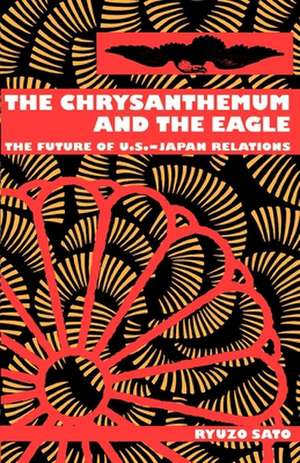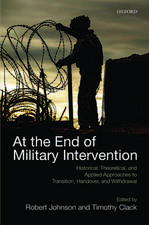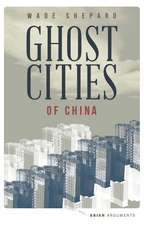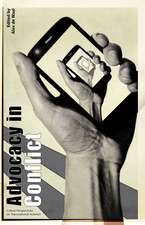The Chrysanthemum and the Eagle – The Future of U.S.–Japan Relations
Autor Ryuzo Satoen Limba Engleză Hardback – 30 iun 1994
--Masamichi Hanabusa Former Japanese Consul General Author of Trade Problems Between Japan and Western Europe Whether in the form of the ongoing automotive wars, books and films such as Michael Crichton's Rising Sun, or George Bush's ill-fated trip to Japan in 1991, frictions between the United States and Japan have been steadily on the rise. Americans are bombarded with images of Japan's fundamental difference; at the same time, voices in Japan call for a Japan That Can Say No. If the guiding principle of the Clinton administration is indeed new values for a new generation, how will this be reflected in U.S.-Japanese relations?
Convinced that no true solution to U.S.-Japanese frictions can be achieved without tracing these frictions back to their origin, Ryuzo Sato here draws on a binational experience that spans three decades in both the Japanese and American business and academic communities to do just that. In an attempt to bridge the communication gap between the two countries and dispel some of the mutual ignorance and misunderstanding that prevails between the two, Sato addresses the following questions: --Is Japan really different?
--Has America's sun set?
--How have conflicting views on the role of government affected U.S.-Japan relations?
--What are the real differences in American and Japanese industrial policies?
--What is the anatomy of U.S.-Japanese antagonisms?
--What effect has the collapse of the bubble economy had on relations?
--What is Japan's future course? Is it truly a technological superpower? Can it avoid international isolation? An incisive personal look at one of the most important political and economic global relationships, written by a major player in the world of international business and finance, THE CHRYSANTHEMUM AND THE EAGLE provides a readable and engaging tour of U.S.-Japan relations, past and present.
| Toate formatele și edițiile | Preț | Express |
|---|---|---|
| Paperback (1) | 221.30 lei 6-8 săpt. | |
| MI – New York University – 30 iun 1995 | 221.30 lei 6-8 săpt. | |
| Hardback (1) | 521.86 lei 6-8 săpt. | |
| MI – New York University – 30 iun 1994 | 521.86 lei 6-8 săpt. |
Preț: 521.86 lei
Preț vechi: 677.74 lei
-23% Nou
Puncte Express: 783
Preț estimativ în valută:
99.87€ • 103.67$ • 83.27£
99.87€ • 103.67$ • 83.27£
Carte tipărită la comandă
Livrare economică 22 martie-05 aprilie
Preluare comenzi: 021 569.72.76
Specificații
ISBN-13: 9780814779712
ISBN-10: 0814779719
Pagini: 240
Dimensiuni: 152 x 229 x 15 mm
Greutate: 0.37 kg
Editura: MI – New York University
ISBN-10: 0814779719
Pagini: 240
Dimensiuni: 152 x 229 x 15 mm
Greutate: 0.37 kg
Editura: MI – New York University
Recenzii
[Sato] sets out to tell Japanese readers how their country looks from the U.S. and why--in his opinion--some American criticisms of Japan are right ... [Sato] strikes gold with a list of things Japan can do to put itself right with the rest of the world.
--Far Eastern Economic Review
--Far Eastern Economic Review
Textul de pe ultima copertă
Whether in the form of the ongoing automotive wars, books and films such as Michael Crichton's Rising Sun, or George Bush's ill-fated trip to Japan in 1991, frictions between the United States and Japan have been steadily on the rise. Americans are bombarded with images of Japan's fundamental "difference". At the same time, voices in Japan call for a "Japan That Can Say No" to American pressures. If the guiding principle of the Clinton administration is indeed "new values for a new generation", how will this be reflected in U.S.-Japanese relations? Convinced that no true solution to U.S.-Japanese frictions can be achieved without tracing these frictions back to their origin, Ryuzo Sato here draws on a binational experience that spans three decades in both the Japanese and American business and academic communities to do just that. An incisive personal look at one of the most important political and economic global relationships, written by a major player in the world of international business and finance, The Chrysanthemum and the Eagle provides a readable and engaging tour of U.S.-Japan relations, past and present.











